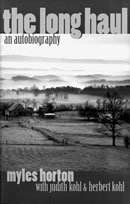 The Long Haul, one of our all-time favorite books, is an auto-biography of Myles Horton, who, through his High-lander Folk School in New Market, Tennessee, helped train Martin Luther King, Jr., Rosa Parks, Eleanor Roosevelt, and Pete Seeger. It is one of the few books we give to staff members and friends. This book puts education goals into a broader perspective of social change—you have to think big, to think of goals that are life-long, goals that won’t inhibit growth but nurture it.
The Long Haul, one of our all-time favorite books, is an auto-biography of Myles Horton, who, through his High-lander Folk School in New Market, Tennessee, helped train Martin Luther King, Jr., Rosa Parks, Eleanor Roosevelt, and Pete Seeger. It is one of the few books we give to staff members and friends. This book puts education goals into a broader perspective of social change—you have to think big, to think of goals that are life-long, goals that won’t inhibit growth but nurture it.
The book is important on many different levels:
On learning and teaching: “If you listen to people and work from what they tell you, within a few days their ideas get bigger and bi ger…you just continue to build on people’s own experience: it is the basis for their learning.” What can we do differently in the classroom if we believe in this?
On democracy: “Stretching people’s minds is part of educating, but always in terms of a democratic goal. That means you have to trust people’s ability to develop their capacity for working collectively to solve their own problems.”
On movements: “I came to realize that things had to be done through organizations. I knew that people as individuals would remain powerless, but if they could get together through organizations, they could have power, provided they use their organizations and not be used by them.”
If Martin Luther King, Jr. and Eleanor Roosevelt can learn from Myles Horton, so can we.
Reviewed by Dennis Littky, Co-Director of the Big Picture Company and Co-Principal of The Met Center, and Seth Linden, M.A.T. student at Brown University.
